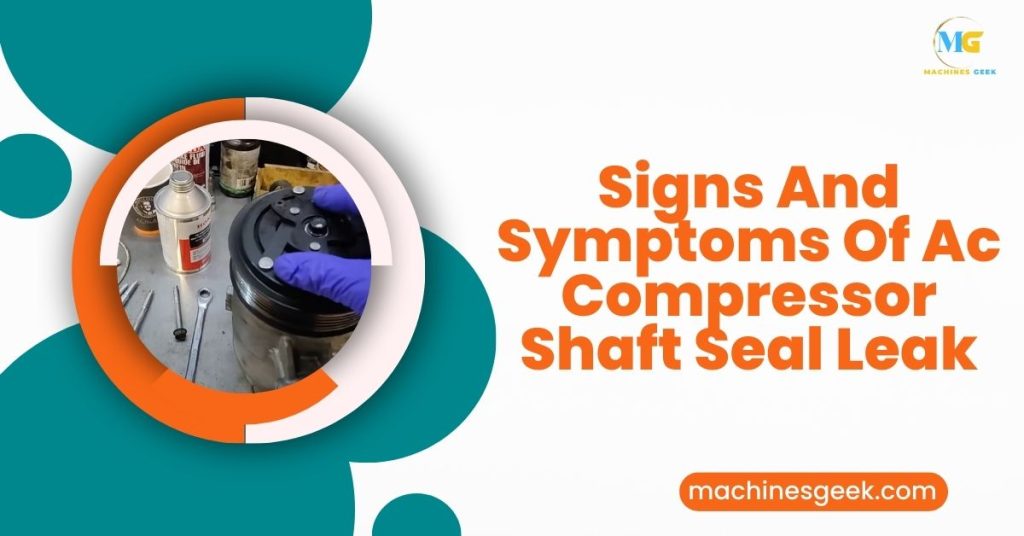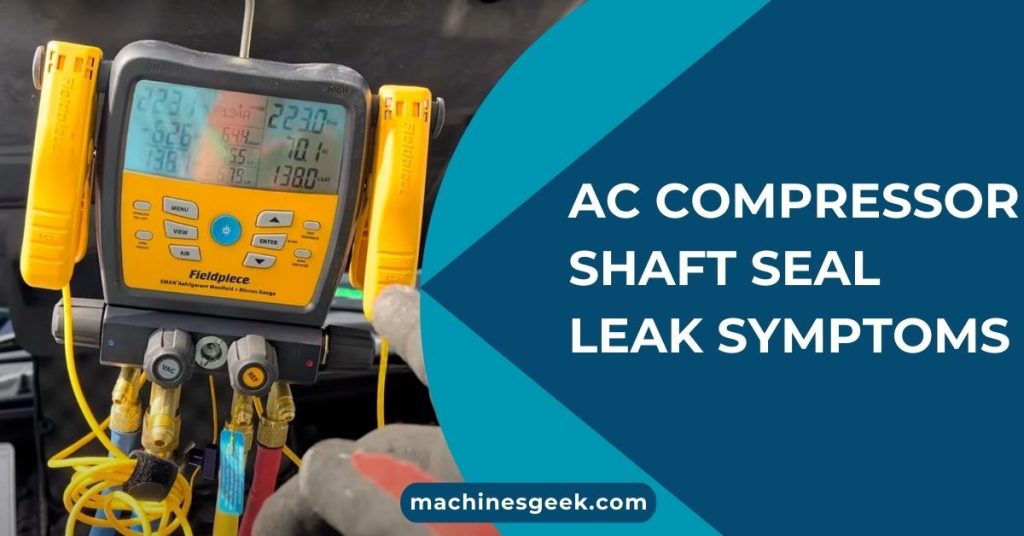AC compressor shaft seal leak symptoms include hissing or bubbling noises when the AC is turned on, a decrease in cooling performance, an increase in fuel consumption, and fluid leaks near the front of the AC system. These symptoms should be checked by a mechanic to determine the extent of the problem and whether the compressor or just the seal needs to be replaced.
A leaking AC compressor should not be ignored, as it can lead to expensive repairs and further damage to the system if left untreated.
Causes Of Ac Compressor Shaft Seal Leak
Shaft seal leaks in AC compressors can cause various symptoms and issues. Common causes of these leaks include worn-out seals, excessive pressure, or improper installation. When the shaft seal leaks, it can result in a hissing sound coming from the engine compartment, a decrease in cooling performance, or an increase in fuel consumption.
It is important to address these symptoms promptly, as driving a car with a leaking AC compressor can lead to more expensive repairs in the future.
Detecting a shaft seal leak can sometimes be challenging, but you can look for signs such as oil excretion from the compressor shaft seal, soil buildup around the leaking seal, or detecting the leak after UV dye injection.
If you suspect a shaft seal leak in your AC compressor, it is recommended to have a mechanic check and repair it to ensure optimal performance of your AC system.
Signs And Symptoms Of Ac Compressor Shaft Seal Leak

Signs and symptoms of an AC compressor shaft seal leak may include a hissing sound coming from the engine compartment, a decrease in cooling performance, and an increase in fuel consumption. It is important to have a mechanic check for these symptoms as they can indicate a leak in the compressor shaft seal.
It is also worth noting that oil excretion from the compressor shaft seal, soil buildup at the leak, and a shaft seal leak detected after UV dye injection are common indications of a problem. Driving a car with a broken compressor is not recommended as it can lead to expensive repairs.
AC compressor leaks can also be accompanied by refrigerant leaks, which are often caused by corrosion over time. Handling air conditioning leaks should be done by professionals for optimal results.
How To Detect AC Compressor Shaft Seal Leak
When it comes to detecting an AC compressor shaft seal leak, one method is pulling the clutch hub. This will allow you to inspect for visual signs of oil excretion at the compressor shaft seal. Another method is to check for soil buildup around the compressor shaft seal, as this can indicate a leak.
Additionally, you can use UV dye injection to detect shaft seal leaks. By inserting UV dye into the system, any leaks will cause the dye to become visible under UV light.
Some symptoms of a bad AC compressor shaft seal include a hissing sound coming from the engine compartment, a decrease in cooling performance, and an increase in fuel consumption.
If you suspect a leak, it is recommended to have a mechanic check your AC compressor. Driving with a leaking compressor can lead to expensive repairs.
Overall, detecting an AC compressor shaft seal leak is crucial to maintaining the efficiency and performance of your AC system. Regular inspection and maintenance can help prevent further damage and costly repairs.
Consequences Of Driving With A Leaking AC Compressor
Driving with a leaking AC compressor can result in expensive repairs that could have been avoided. One potential consequence is damage to other components of the AC system. When the compressor shaft seal leaks, it can lead to oil excreted from the seal and soil buildup around the area.
This can eventually cause a decrease in cooling performance and an increase in fuel consumption. Additionally, a hissing or bubbling noise may be heard from the engine compartment. It is important to have a mechanic check these symptoms and address the issue promptly to prevent further damage and costly repairs.
Symptoms of a Leaking AC Compressor Shaft Seal
- A hissing sound coming from the engine compartment
- A decrease in cooling performance
- An increase in fuel consumption
How To Handle Air Conditioning Leaks Like A Pro
Regular maintenance and inspection of your air conditioning system is crucial to prevent and address AC compressor shaft seal leaks. These leaks can cause various symptoms such as a decrease in cooling performance, an increase in fuel consumption, and hissing or bubbling noises coming from the engine compartment. To address AC compressor shaft seal leaks effectively:
- Have a mechanic check for oil excreted from the compressor shaft seal and any soil buildup at the leak site.
- Use UV dye injection to detect shaft seal leaks.
- If the compressor shaft seal is found to be bad, pulling the clutch hub can provide confirmation.
- Address any detected leaks promptly to avoid further damage to the air conditioning system.
By following these steps and staying proactive with regular maintenance, you can handle AC compressor shaft seal leaks like a pro and keep your air conditioning system in optimal condition.
Can a Leak in the AC Vent Cause Damage to the Compressor Shaft Seal?
Yes, an ac vent leaking water fix is crucial because a leak in the AC vent can indeed cause damage to the compressor shaft seal. The water can infiltrate the system, leading to corrosion and ultimately damaging the seal. It’s important to address any leaks promptly to prevent costly damage.
Frequently Asked Questions
How Do I Know If My Compressor Shaft Seal Is Bad?
To determine if your compressor shaft seal is bad, look for signs such as oil excretion, soil buildup, or a leak detected after UV dye injection. Pulling the clutch hub can help you identify the problem. Avoid driving with a broken compressor to prevent costly repairs.
Oil leaks may indicate an issue with the compressors, possibly caused by corrosion.
How Do I Know If My Car AC Compressor Is Leaking?
To determine if your car’s AC compressor is leaking, look for these signs: oil excreted from the compressor shaft seal, soil buildup at the compressor shaft seal, or a shaft seal leak detected after UV dye injection. You may also notice a hissing sound, decreased cooling performance, or increased fuel consumption.
Have a mechanic inspect your AC system for confirmation.
Can You Drive A Car With A Leaking AC compressor?
Driving a car with a leaking AC compressor is not recommended. It can lead to expensive repairs and affect the cooling performance. It is best to get the compressor fixed to avoid further damage.
Does Ac Compressor Leak Oil?
Yes, AC compressors can leak oil, typically in combination with a refrigerant leak. Oil leaks can occur due to compressor issues or erosion of metal reservoirs and piping over time. Look for oil excretion, soil buildup, or detect it after UV dye injection.
Avoid driving with a broken compressor to prevent costly repairs.
Conclusion
To identify a potential AC compressor shaft seal leak, be on the lookout for oil excreted from the seal, soil buildup around it, or any leaks detected after UV dye injection. These symptoms are often accompanied by a hissing sound, decreased cooling performance, or increased fuel consumption.
It’s crucial to have a mechanic inspect and address these issues promptly. Ignoring a leaking AC compressor can lead to costly repairs that could have been avoided. Don’t let a small problem become a big one, take action as soon as symptoms arise.








